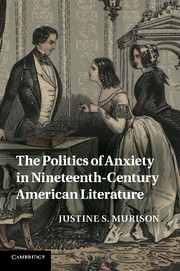Book contents
- Frontmatter
- Contents
- Acknowledgments
- Introduction
- 1 A bond-slave to the mind: sympathy and hypochondria in Robert Montgomery Bird's Sheppard Lee
- 2 Frogs, dogs, and mobs: reflex and democracy in Edgar Allan Poe's satires
- 3 Invasions of privacy: clairvoyance and utopian failure in antebellum romance
- 4 “All that is enthusiastic”: revival and reform in Harriet Beecher Stowe's Dred
- 5 Cui bono?: spiritualism and empiricism from the Civil War to American Nervousness
- Epilogue: the confidences of anxiety
- Notes
- Index
- CAMBRIDGE STUDIES IN AMERICAN LITERATURE AND CULTURE
Epilogue: the confidences of anxiety
Published online by Cambridge University Press: 01 June 2011
- Frontmatter
- Contents
- Acknowledgments
- Introduction
- 1 A bond-slave to the mind: sympathy and hypochondria in Robert Montgomery Bird's Sheppard Lee
- 2 Frogs, dogs, and mobs: reflex and democracy in Edgar Allan Poe's satires
- 3 Invasions of privacy: clairvoyance and utopian failure in antebellum romance
- 4 “All that is enthusiastic”: revival and reform in Harriet Beecher Stowe's Dred
- 5 Cui bono?: spiritualism and empiricism from the Civil War to American Nervousness
- Epilogue: the confidences of anxiety
- Notes
- Index
- CAMBRIDGE STUDIES IN AMERICAN LITERATURE AND CULTURE
Summary
Their box, their great common anxiety, what was it, in this grim breathing-space, but the practical question of life?
Henry James, The Wings of the Dove (1902)By 1880, the argument between spiritualism and neurology ultimately turned on methodology as much as on the question of faith. What counts as evidence of experience, whether that experience is of internal symptoms or external events? In answer, spiritualists championed human testimony while neurologists such as Beard saw in it only conscious and unconscious deceptions. Reflecting on his own experiences with mediums such as Leonora Piper in “The Confidences of a ‘Psychical Researcher’” (1909), William James confronted these issues as a scientist fascinated by the supernormal. He laments that, though he has spent the last twenty-five years trying to understand psychical phenomena, he is no closer to an explanation. He remains baffled by the quandary of evidence in spiritualism, the purported need to delineate “honest” occurrences from fraudulent practitioners. How can scientists make this distinction with a straight face, James asks, when they themselves often fudge their public performances? He recalls a time he did just this as an assistant for a lecture on nervous physiology at Harvard University. The goal of the lecture was to display the reflex action of a turtle's heart, but the heart's muscles and nerves were so exhausted they could no longer even perform the reflex. All they could do was arrest motion, and they did that much too perfectly.
- Type
- Chapter
- Information
- Publisher: Cambridge University PressPrint publication year: 2011

